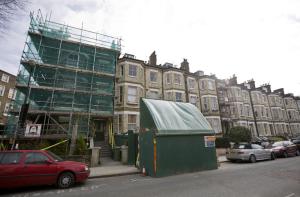In London’s most upmarket districts, shovel-wielding teams are hard at work in what look like mines hidden beneath luxury homes, sidestepping the British capital’s planning rules by expanding underground.
Some of their more hi-tech kit may end up buried there — it is reported that the cost of bringing it back above ground is more than its value — and the bowels of the British capital have already become a graveyard for around 1,000 excavating machines.
The trend started in the late 1990s, when residents developed small basements, calculating it was a cheaper way of increasing floorspace than moving house while sticking to the strict height rules imposed by the city’s conservation bodies.
But Paul Schaaf, partner of architectural firm The Basement Design Studio, told AFP that since the 2008 recession, his firm has largely been called in to help with vast spaces beneath houses in the opulent neighbourhoods of south and west London.
“We ended up doing different ones, larger ones where people weren’t so much affected by the recession in well-established residential properties, in Kensington and north London,” he said.
Permit applications for this type of work have soared: in 2013, Kensington and Chelsea Town Hall received 450 compared to just 20 a decade ago.
“We’re talking about two or three floors down and extending beyond the boundaries of the garden. It can sometimes go under the road,” complained Murad Qureshi, a Labour member of the London Assembly, the elected body that holds the London mayor to account.
Often the new spaces house luxurious marble swimming pools, home theatres or garages for classic cars.
“This is really the super-rich extending very large properties even further, ” Qureshi said, calling the properties “iceberg homes”.
Last year, Qureshi unsuccessfully tried to impose limits on such developments in the capital.
“A lot of local residents are very concerned about these extensive developments causing floods, sink holes, structural damage to neighbouring properties and the construction of these deep basements is very disruptive to the immediate neighbourhood,” he said.
– ‘Living in a building site’ –
The work can take several months, even years.
At the chic Orme Square in Westminster, a sewer recently collapsed. The road above had been carrying trucks laden with soil removed from the home of a famous English television presenter.
For two fed-up residents, who wished to remain anonymous, the link is clear.
read more…
http://news.yahoo.com/londons-iceberg-homes-plumb-citys-depths-102322228.html

